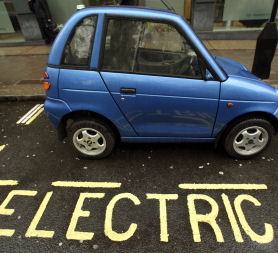Ten ideas to save the planet: British racing green
While the British government pushes battery-powered cars with cash incentives our experts give us their opinion on whether fuel cells are the future of emission-free vehicles.

What idea policy or technology holds the greatest promise for tackling climate change? That was the question Channel 4 News posed to the scientific community over the past few weeks.
Thanks to the extensive contacts of the Science Media Centre at the Royal Institution Channel 4 News was able to email hundreds of scientists across various fields of expertise to sound-out their opinions.
Plug in and go
The UK government is currently pumping money into battery powered cars. In April plans were announced to offer motorists £5,000 incentives to encourage them to buy electric or hybrid cars.
The move is part of the government’s £250m plan to promote low carbon transport over the next five years.
The motor industry is striving to answer demand with the race on to develop the most efficient, clean and aesthetically pleasing car.
But can this motoring revolution live up to the hype?
Some scientists who responded to our call for climate change ideas warned that without greener means of creating electricity the cars may have little environmental benefit.
Climate change: 10 ideas to save the planet
“It is generally agreed that electric cars are a good thing, and indeed they are, provided that the power generation which supplies them is from low-CO2 technology such as nuclear or renewable,” said Professor Roger Morgan from Liverpool John Moores University.
“If more than a small proportion of houses in a typical residential development have electric cars charging overnight, we will exceed the capacity of the local electricity distribution network.”

Green on the grid
Battery powered cars are not the only way to create emission free cars.
Fuel cells generate power quietly, efficiently and without pollution. They convert the chemical energy of a fuel and oxidant into electrical energy. The most common type of fuel cell uses hydrogen to produce electricity, with water vapour and heat as by-products.
Fuel cells are expensive to produce but some have already raced ahead to capture the emission-free market.
Last year the world’s first international hydrogen-powered motorsport race was held in Rotterdam. Formula Zero believes it creates a “passion for sustaining life on the planet and passion for racing.”
Motoring giant Honda has also began the first commercial production of a hydrogen-fuelled car. Launched last year the FCX Clarity claims to be three times more fuel-efficient than traditional petrol cars.
But the technology is expensive and one of the biggest obstacles is the lack of commercial hydrogen-fuelling stations.
Critics have also pointed out that hydrogen is commonly produced by fossil fuels which have a negative impact on the environment.
Addressing climate change requires a range of technologies, and emission-free cars, powered by electricity, are sure to be a part of that mix.
But switching to this energy source means demands for electricity will rise. A number of the scientists who contacted Channel 4 News were in agreement that development is needed to meet this demand.
Formula Zero believes it creates a “passion for sustaining life on the planet and passion for racing”
“Decarbonise electricity supply; switch energy sources to electricity; push energy efficiency hard to allow the first two,” said John Richard from Sustainability.
Prof Peter White from Coventry University said: “The source of electricity would need to be non carbon dioxide producing which would require nuclear, wind, wave, tidal, solar thermal and PV.
“All would need to be in much greater numbers than we have or have currently proposed.”
-
Latest news
-
‘Russian aggressions have never pushed Georgia to deviate from its own path’, says Georgian President5m

-
Why is Georgia’s ruling party so intent on adopting ‘foreign influence’ bill?5m

-
Trump’s lawyers try to paint Michael Cohen as liar out for revenge at trial3m

-
England’s schools told not teach gender identity2m

-
Slovakia PM shooting: Suspect charged with attempted murder3m

-




